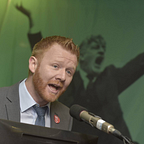Austerity kills – “A national disgrace”
Published: Thursday 4 December 2014
THE body of Jonathan Corrie, a homeless, 42-year-old father of two from Kilkenny, was found just metres from Dail Eireann on December 1.
Over the past six years or more, politicians inside that building made political choices that put Mr Corrie on the streets and failed him, his family and the rest of society.
Cuts to homelessness services, failure to adequately invest in mental health services, a disastrous housing policy, a persistent and relentless adherence to austerity – all were political choices that no doubt played a part in Mr Corrie’s passing.
In November, we heard how Conor Cribbin, a 25 year old suffering from ADHD and in need of expensive medication took his own life days after hearing his medical card had been stopped.
He’d also learned a few days before that he’d been denied a college grant.
Galway Coroner Dr Ciaran MacLoughlin said: “Those drugs are quite expensive and it may have been enough to create a situation he could not handle. This may be one of the consequences of austerity.”
Austerity has negatively impacted on almost all households in Ireland – but some more than others.
The above examples are but two from the thousands upon thousands who’ve suffered in silence over the past few years. And yet politicians of all hues express sympathy, horror, grief, shock and all other emotions that can easily be jotted down on paper.
Actions, it seems, are much harder than expressions of emotions.
Let’s examine political actions. How was the tax cut of €405m for the top 17% of earners in the recent Budget going to help out the above victims of austerity?
How was the tax cut for chief executives of multinational corporations supposed to help them?
How is the refusal to tax wealth or to implement real and effective corporation tax measures going to prevent these incidents from occurring again?
Inequality was growing long before the bank guarantee and the subsequent bailout. Decades of policies implemented by all political parties who entered government ensured that that income gap grew and grew with the result being that working class people experience death at a much younger age than those from a more affluent background.
The Institute for Public Health (IPH) estimates that more than 5,400 preventable deaths occur every year due to income inequality.
A recent report showed that people living in Blakestown in North West Dublin, a working class community, experienced cancer death rates of 381 per 100,000 compared with 128 per 100,000 in Castleknock South East, a more affluent area. That means if you live in a working class community and you’re diagnosed with cancer, you’re three times more likely to die than if you’re from a wealthy background.
So much for treating all the children of the nation equally.
Kathleen O’Meara from the Irish Cancer Society explained: “In some deprived Dublin areas, there are not enough primary care resources – for instance, in North Dublin there is one GP for every 2,500 people. Nationally this figure is 1:1,600.
“In addition there have been increased A&E charges, long stay charges and increased prescription charges. By 2013, it has meant that every person in Ireland was on average paying about €100 in additional costs for accessing care and prescribed drugs.”
This is the result of inequality and austerity. And the result of political choices.
The homelessness crisis and the mental health crisis do not exist in a vacuum. They’re the direct result of political choices where we give tax breaks to the rich and cuts to the poor.
And it’s all wrapped up in a convenient blanket of, “there is no alternative”.
We can’t invest more in tackling homelessness – because that would mean taxing wealth.
We can’t tackle mental health disorders – because that will mean no tax breaks for the well off.
We can’t create a more equal and fairer society – because we’re busy bailing out speculative bondholders and refusing to write down debt.
These are choices. Jonathan Corrie and Conor Cribbin’s deaths are the result of those choices, as are the tens of thousands of others who die from inequality without the attention they deserve. Dublin Lord Mayor Christy Burke referred to the death of Mr Corrie as “a national disgrace”, and he’s right. But so is the death of Mr Cribbin and all of the others who have lost their lives due to our collective failure to tackle inequality and austerity.
The unnecessary deaths of these young men should enrage you. But their deaths should not be in vain and we must focus on solutions. Closing the inequality gap and voting for political parties and individuals who advocate that position is a start.
Demanding an end to austerity is another and holding politicians accountable for their failure to challenge the “there is no alternative” mantra is another.
By David Gibney
Mandate Communications Officer
